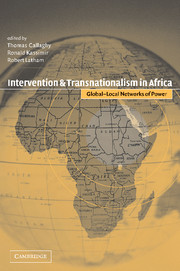Book contents
- Frontmatter
- Contents
- List of contributors
- Preface
- List of abbreviations
- 1 Introduction: transboundary formations, intervention, order, and authority
- Part I Historical dimensions and intellectual context
- Part II Theoretical frameworks
- Part III Transboundary networks, international institutions, states, and civil societies
- Part IV Political economies of violence and authority
- 9 How sovereignty matters: international markets and the political economy of local politics in weak states
- 10 Out of the shadows
- 11 New sovereigns? Regulatory authority in the Chad Basin
- Part V Conclusion
- References
- Index
11 - New sovereigns? Regulatory authority in the Chad Basin
Published online by Cambridge University Press: 18 December 2009
- Frontmatter
- Contents
- List of contributors
- Preface
- List of abbreviations
- 1 Introduction: transboundary formations, intervention, order, and authority
- Part I Historical dimensions and intellectual context
- Part II Theoretical frameworks
- Part III Transboundary networks, international institutions, states, and civil societies
- Part IV Political economies of violence and authority
- 9 How sovereignty matters: international markets and the political economy of local politics in weak states
- 10 Out of the shadows
- 11 New sovereigns? Regulatory authority in the Chad Basin
- Part V Conclusion
- References
- Index
Summary
The frontiers of power are changing. Or at least this is what we are compelled to conclude when we see how transformations in local, inter- and transnational politico-economic relations have caused unprecedented relationships in the contemporary world. This is evident in instances of mass mediation, which have allowed community and place to become largely unhinged, and in the transnational realms created by new financial instruments and technologies, where time and place are uncoupled and hence jurisdiction unsettled. Under the somewhat vague rubric of “globalization,” these complicated phenomena are apprehended in terms of certain tropes: territory, place, and space are perhaps foremost among them. Their predominance has significant consequences for how we confront the problem of transformations in the nature of power and authority in the world today.
This emphasis on space and place – on the changing geography of power – is, of course, warranted. A great part of what we are witnessing – the increasing mobility of capital and labor, the intensification of disciplinary mechanisms and regulatory authority associated with world financial institutions, the rupture of boundaries brought on by new technologies and media forms, and the extension of diasporas as distinct geo-political entities – results from, and contributes to, the destabilization of the territorializing project of the nation-state (most clearly demonstrated by Appadurai 1990, 1996). Thus while inter- and transnational phenomena are by no means new aspects of nation-based geo-politics, the idea, for example, that “the national economy” is a naturally occurring part of the nation-state – that “economy” is naturalized as “national” – is only now being interrogated or rethought.
- Type
- Chapter
- Information
- Intervention and Transnationalism in AfricaGlobal-Local Networks of Power, pp. 240 - 264Publisher: Cambridge University PressPrint publication year: 2001
- 26
- Cited by



